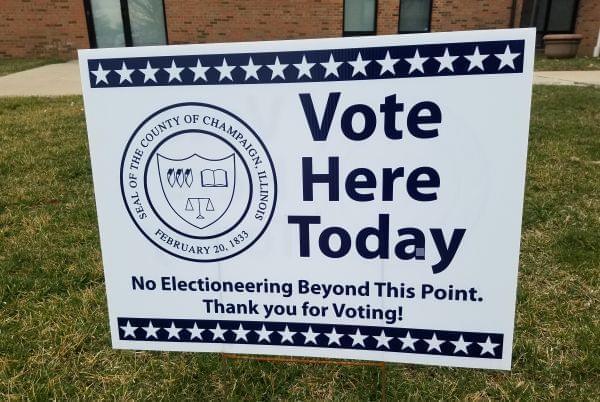Should The Voting Age Be Lowered?; ‘Hamilton: The Exhibition’; Food As Medicine; Rescuing Tortoises

A sign outside the Champaign County Clerk's Office in Urbana marks it as a polling place for the Illinois Primary on March 20, 2018. Jim Meadows/Illinois Public Media
On the 21st: An organization led by students wants to lower the voting age to 16. Plus, if you can't get enough of the musical 'Hamilton,' a new exhibit is coming to Chicago this fall. We also learn more about the idea of 'food as medicine,' and check in with the Shedd Aquarium about their efforts to rescue endangered tortoises in Madagascar.
Over the past several months, high school students have been organizing marches and pushing for change in their communities. But many of these students calling for change aren’t even old enough to vote.
Vote16 Illinois is one organization hoping to change that. Established back in 2016, their goal is lowering the voting age to 16, allowing teenagers to vote in municipal elections and influence local legislation.
Back in the fall of 2016, as a high school senior, Carlie Hansen and another student at Northside College Prep in Chicago co-founded the Illinois chapter of Vote16. Now, Carlie is a rising sophomore at Bryn Mawr and is double majoring in political science and biology. She’s back home in Chicago and she joined us to talk about Vote16.
Some municipalities have already extended the right to vote to 16-year-olds, including some U.S. cities. In Takoma Park, Maryland, outside of Washington D.C., 16-year-olds have been able to vote since 2014.
— The 21st (@21stShow) May 18, 2018
Read more about @vote16il here: https://t.co/X6rOiHOYmv
Plus—
It’s been nearly three years since the show first opened on Broadway. And since then it’s spread to dozens of major cities across the country and even to the UK.
We’ve also seen it grow beyond the musical itself, in the form of additional music and even a new book.
Now, Chicago is getting its own exclusive exhibition opening on Northerly Island this fall. Hamilton: The Exhibition. It’s being billed as a one of a kind, interactive look at the story of America’s founding, all told from the perspective of Alexander Hamilton.
Chris Jones is the theater critic for the Chicago Tribune. He reported on this for the paper and he joined us on the show to talk about this.
"What they’re going to be able to do that no other museum has been able to do, is integrate an exhibition about American history with the biggest hit show of the last hundred years."
— The 21st (@21stShow) May 18, 2018
—@ChrisJonesTrib, on Hamilton: The Exhibition, opening in Chicago this fall.
And—
Last month, police in Madagascar made a shocking discovery. They were sent to investigate foul smells coming from an abandoned two-story house. And they found more than 10,000 critically endangered tortoises living in horrific conditions.
Several hundred of the tortoises were already dead or dying due to the horrific conditions when police arrived. According to reports, the reptiles covered nearly every inch of the dirt-covered floor and had no access to food or water.
Over the past few decades, this population of this particular species of tortoise, the radiated tortoise, has declined by 80 percent at the hands of illegal wildlife traffickers.
We were joined by Dr. Matt O'Connor. He is a University of Illinois alumni as well as a veterinarian at the Shedd Aquarium in Chicago. Dr. O’Connor is part of the team helping to rescue and treat these tortoises.
Dr. Matt has been helping the radiated tortoises which are famous for their beautiful shell. Unfortunately, the number of radiated tortoises has declined by 80 percent over the past 30 years due to the illegal pet trade.
— The 21st (@21stShow) May 18, 2018
Read more here: https://t.co/IYe0unE3OQ
But first—
With all the attention we pay to health care dollars and to our own health care, how much do we think about what we eat? Well the idea of food and medicine isn’t new. It’s as old as medicine itself. But what does it really mean?
This is being explored at a symposium that’s taking place this weekend at the Chicago Botanic Garden. It’s being sponsored by North Shore Health System. One of its integrative family doctors, Dr. Geeta Maker Clark, joined us to talk about this. Dr. Maker Clark is Coordinator of Integrative Medical Education & Culinary Medicine for the University of Chicago Pritzker School of Medicine.
The concept of “Food as Medicine” is an ancient one, according to Dr. Geeta Maker-Clark.
— The 21st (@21stShow) May 18, 2018
"It’s an opportunity for us to go back to our roots in medicine. Before we think about a drug to cure us, let’s look at our lifestyle and what we’re eating.”@UChiPritzker @NorthShoreWeb

